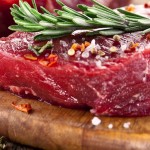 High protein diets, such as Atkins or Ideal Protein Diet, are popular among dieters and muscle-builders, and research has suggested that the increased protein promotes fullness, and boosts metabolism. But at this year’s Obesity Week, a new study showed that while a high-protein diet is tied to a higher metabolism, including 45 percent more storage of lean tissue when compared with a low-protein diet, the increase in metabolism declines when one’s protein intake decreases to a ‘normal’ level.
High protein diets, such as Atkins or Ideal Protein Diet, are popular among dieters and muscle-builders, and research has suggested that the increased protein promotes fullness, and boosts metabolism. But at this year’s Obesity Week, a new study showed that while a high-protein diet is tied to a higher metabolism, including 45 percent more storage of lean tissue when compared with a low-protein diet, the increase in metabolism declines when one’s protein intake decreases to a ‘normal’ level.
Instead of focusing on weight loss, the study addresses whether high-protein or low-protein diets might lead to less weight gain when taking in excess calories due to the ability of the body to burn extra energy as a result of the high-protein diet. The participants all packed on similar amounts of weight regardless of their diet composition, but there was a significant difference in how the body stored the excess calories: Those who consumed normal-protein and high-protein diets stored 45 percent of the excess calories as lean tissue or muscle mass, while those on the low-protein diet stored as much as 95 percent of the excess calories as fat. Further, the findings show that the increase in metabolism tied to a high-protein diet was not sustainable when changing to a normal-protein diet, suggesting that the human body cannot be trained to maintain a higher metabolism.
Steven R. Smith, President of the Obesity Society, said that the results reinforce the importance of energy deficit for weight loss, highlighting that weight loss regardless of diet composition is not possible without taking in fewer calories per day than those burned. It’s important to balance how many calories you eat and how many you burn on a daily basis. This concept, also known as energy balance, is vital for weight control.
An important element to remember is that the participants in this study are overeating, rather than put on diets or restrictions. They are taking in more than their normal caloric requirement and so it leaves open the question of how applicable the findings are to dieting and people trying to lose weight. After bariatric surgery, eating enough protein is an important part of the lifestyle changes that give the best chance for success. However, eating protein itself is not sufficient for weight loss. Any weight loss patient should work with their doctor to figure out the right amount of protein for both optimal health and weight loss.
In an article explaining the science behind how high-protein diets work, Dr. Terry Simpson said, “going on a low carb diet means a rapid weight loss. This provides incentive to continue with a diet while eating foods that many love: steak, eggs, bacon, and cheese. But you’re not losing fat, you’re losing glycogen and water, and that worries us doctors. He says that “people who persist in high protein diets for long periods of time have incorporated vegetables into their diet as a source of carbohydrates. They remain fit and strong because they have avoided the junk food of modern life. But those who fail to incorporate enough fruits, vegetables, or starches will have quick weight loss, but not permanent weight loss.” You can read his article here.
Related Reading: Too Little Protein, More Body Fat






Nutrition & Lifestyle